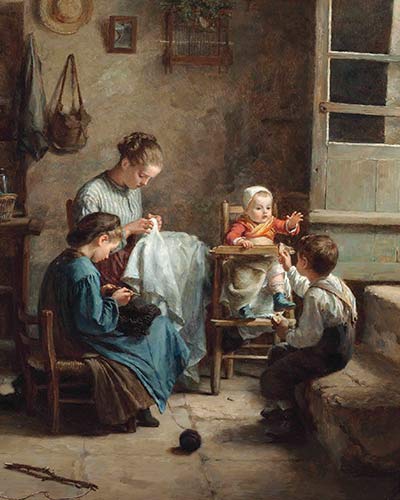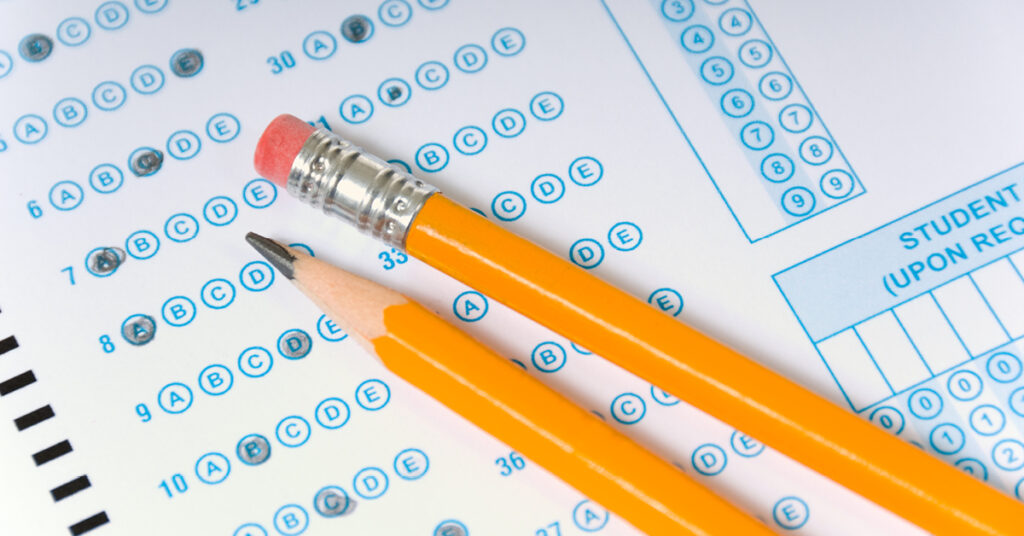We recently completed our first standardized testing. This is not required in our state, but I did want to get a snapshot of where Caroline is at this point in our relaxed homeschooling journey with a gifted/2e child. I had the opportunity to do a Stanford Achievement Test with her as part of doing a review of Homeschool Testing Services so I decided it was a good time to do this. I highly recommend you click over and read Stanford Achievement Test for Homeschoolers first so you have the background and then read this post about our experience with standardized testing as homeschoolers.
Homeschool Standardized Testing Goals
When I decided to do a standardized test, I had a few goals in mind including:
- Confirm that I was still perceiving Caroline’s strengths and weaknesses accurately
- Provide her with experience taking a standardized test
- Be successful in taking a standardized test for the first time and avoid creating test anxiety of any kind
- Get a glimpse of how our relaxed homeschooling approach has worked overall
I know what Caroline’s strengths and weaknesses are since she has been formally diagnosed with both dysgraphia and dyscalculia. I wrote earlier this year about my relaxed homeschooling goals for middle school if you want to see in more detail my thinking about where she was last summer/early fall and where I want to get her over the next three years. I wanted to confirm I was still on the right track.
At some point, Caroline will probably need to participate in some kind of standardized testing for a real reason. I did not want her first experience to be something like the ACT or even preparing for the ACT. I thought this was a good way to get her experience in this aspect of education when there is virtually no long-term downside to doing this.
I purposely ordered a test one grade below the grade she is currently in. I wanted her to be successful. I knew because of her dyscalculia that the math portion was going to be a challenge, but I didn’t want it to be devastatingly difficult.
It was very important to me that she not be stressed out about the test. I did not want to create test anxiety in her. This test was a good fit in that it is not timed and there is zero writing. Everything is fill in a bubble. She could take as much time as she needed and didn’t need to worry about writing. It was win-win to set her up for success with no need to worry about accommodations.
By way of comparison, there are now lots of online standardized tests that will adapt during the testing process in order to create a more personalized testing experience. That sounds good, but I learned when we did a review of CTC Math that Caroline becomes frustrated when she is working on something online, realizes she made a mistake she wants to correct, and isn’t allowed by the program to go back and change her answer. She really liked that math program at first, but grew to dislike it because it left her so frustrated. And I can see her point. I would also find that frustrating and it would eat at me to know that I realized my mistake and could not correct it.
So I don’t think I would do an online standardized test with her unless it gave her the trade-off of being able to type her answers rather than needing to write long answers by hand. Then we’d have to weigh the pros and cons of both and make a decision. I’m guessing she would choose skipping the writing by hand and putting up with the inability to go back to fix answers but we’ll cross that bridge in/when we get there.
Preparing For Standardized Testing
Caroline went into this test basically cold. I had printed off a few practice tests I found online, but we only did a bit of them before she got sick. When the test came, it didn’t look anything like the practice tests so they wouldn’t have helped all that much in retrospect.
I explained to her most schools spend weeks getting ready for tests like these, coaching the students extensively on how to read the questions, understand what is being asked, doing practice tests, etc. So I do believe she could have scored even higher on some of the portions if she had been coached on how to take the tests.
The other thing I did to prepare her is I emphasized that when they create these tests they expect most of the students to get wrong answers. They do not expect students to get them all right. I emphasized that I knew there would be things she would not know how to do and that was totally fine. I made it abundantly clear that getting 100% on every part was not a reasonable goal.
Classic 2e Testing Results
Gifted kids are asynchronous in their learning and 2e kids take that to another level. So when people try to explain gifted kids, they might give an example of a child who:
- speaks like an adult
- reads like a ninth grader
- plays like a fifth grader
- does math like a fourth grader
- discusses history like a high schooler
If the child is twice-exceptional (2e), they do all these kinds of things and then you also throw in a learning challenge (or two or three or…) So when you test these kids, you end up with scores that are ALL OVER the place because their learning levels are all over the place depending on their particular set of gifts and learning challenges.
And oh my. We clearly saw that with her test results. She had results on some sections that placed her in late high school and beyond. She had other test results that were well below grade level. She had many that were solidly above average and some in the average range. Her overall Complete Battery was way above grade level, but even that high score was pulled down by some of her scores in a few areas that were very low.
She had some results that FAR exceeded my expectations even though I knew she had strengths in certain areas.
I actually laughed out loud at some of the results. For example, she got 100% on the Political Science section. We discuss politics and government regularly in our home, take her with us when we vote, have her watch things with us, etc. However, I think what especially helped her was the fact that we let her watch the first season of Designated Survivor this winter. I started watching it and was hooked. I let her watch the episodes after I did. She loved it.
At one point while she was taking the test, she indicated she didn’t understand one of the questions. I said, “Think about what you know from watching Designated Survivor.” She looked at it again and immediately knew the answer. And she rocked the rest of it too. It just goes to show that you never know what you can find that will help kids learn something!
Overall, she crushed the entire Social Science portion. It was her highest overall score.
She also scored 100% on the Synonyms part of the Vocabulary portion which did not surprise me but also fascinated me. We knew from the gifted testing that verbal ability and vocabulary is one of her strengths. I think (like her mother) she is naturally wired for this and spending all your time with two chatty adults with rich vocabularies and a love of verbal antics will build on that even further, I think.
Related to this, she scored extremely well on the Listening portion. That fascinated me given how she struggles with auditory issues. Behind Social Science, it was her overall highest score.
She also scored well on Reading Comprehension which was interesting to me because she’s not an avid book reader at all and we’ve not done much formal work in that area. But we have read a lot to her since she was tiny and we discuss things all the time so I think it simply transferred over to that test.
Spelling was another area of strength for her which also makes me laugh a bit. We never did phonics with her (she hated phonics and was confused by it) and she’s a right brain learner so she learns whole to part. I’ve never done a formal spelling program with her. She basically taught herself to spell by playing online games (Minecraft, Roblox, Animal Jam, etc.) when she wanted to communicate with other players. I have started to spot check her a bit to see if she’s still advancing and when I see a “rule” or spelling pattern she hasn’t figured out on her own, I point it out to her.
The areas where she scored less well all made sense to me. Some of the sections were clearly designed for kids who were in a classroom where the teacher could teach to the test. This was clear in some of the science and in the writing especially.
She did very well overall in the Science portion with the exception of one part that was very low. That’s because she’s never approached science in that way. Considering we’ve been very much relaxed homeschoolers with science, I was thrilled with how well she did. She was overall way above grade level with the exception of one portion that dragged down her overall score. Otherwise she did great. If I had coached her beforehand, she would have been able to do better in that one portion.
The entire Writing section had a “vocabulary” that if you weren’t familiar with made it much more difficult to score well. Either you had been taught to the test in this area or you were going to be at an obvious disadvantage. This was especially true because they are testing writing and composing in a multiple choice format which also makes it kind of weird overall.
As soon as I saw the test when it came, I knew she would not score well in this section. So I was not at all surprised that this was one of her lower scoring areas. She had not been taught how to succeed in this section so I’m not really too concerned about this. I already had it on my radar to begin formally doing a writing program with her starting soon and we’ll get her up to speed on this. I’m not concerned. She has great ideas, a great vocabulary etc. She simply needs to learn how to organize it for other people to read.
And that brings us to Math. Yes, math. We will press on. LOL! On the bright side, we can see it is getting easier for her so I have hope that we will be able to eventually get her to proficient levels in math.
Seeing The Big Picture
I think the most rewarding part of doing this testing is that it reinforced for Caroline that she really is a bright young lady. Being 2e with both giftedness and learning challenges is a HARD combination. So many 2e kids think they are dumb because they struggle so much in certain areas where they have legitimate challenges. It is heartbreaking because it often overwhelms or seemingly negates all of the areas where they are truly gifted.
We have come such a long way over the past few years. Seeing the test results demonstrated to her that she is very capable. She was really proud of how many above averages she had on her tests and how many areas where she obviously excelled. It also clearly showed her where she needs to put forth concentrated effort to get over the proverbial hump in certain subjects.
So I think we both came away more focused and on the same page regarding where we need to spend our time over the spring and summer.
Standardized Testing Again?
We will definitely do another test. I told her we will do another test next year. They are really not that expensive and I would like to try another one after we put more focus on her areas of weakness.
I hope people find this post helpful, especially those with gifted/2e children. Based on our experience, I believe there can be real value in utilizing a test like the Stanford Achievement Test with kids who are gifted/2e and homeschooled.










 Stanford Achievement Test For Homeschoolers
Stanford Achievement Test For Homeschoolers
I’m very glad this was a positive, no anxiety, experience!
We’ve done standardized testing from the beginning, as suggested to us by a local HS Mom. Massachusetts is full of regulations and for her, despite learning disabilities in her own children, she noted these tests made life easier with our school system. My engineer husband likes them for the numbers they give. I’m fortunate all my children text well. Much like Carolyn, my son Noah is all over the map having had an extensive eval. in 2017. He too struggles with math, and also sequencing, rapid recall. This has always been reflected in the tests, but we now have a better understanding of the results.
On an amusing note, I remember Maddie’s first test, she was stumped by two vocab words: cafeteria and gymnasium. ?
Thank you for sharing this positive experience.
Hi Kelley,
That’s a funny story about Maddie. It’s interesting the things kids learn and don’t learn depending on where they are educated. I remember at one point having to teach Caroline both how to stand in line and raise her hand. She had never been in a situation where she had to do either. These kinds of things are a big reason we insisted on her taking gym at co-op. She had to learn how to do group participation things, give and take, etc. with other kids. It’s something you almost have to plan for with a homeschooled only child. On the other hand, she’s had lots of experience in areas where traditionally educated children haven’t. Everything is a trade-off.
Re: rapid recall… That’s a big challenge associated with dyscalculia. That was one of the pluses of the Stanford test. No time stress with it.
Good to hear from you!
Sallie
Our children have had similar results with standardized testing: some areas of weakness where we haven’t been teaching to the test, but also areas of great strength, because they are able to and allowed to work far above grade level.
Hi Peggy,
I think you’ve mentioned before you’ve been doing testing for some time. Have you changed how you’ve prepared your children for the test? Any suggestions for those of us who are newer to utilizing standardized tests in our homeschool?
Sallie
I’m a believer in using standardized tests not to assess their capacity by age, but by grade level. My 7yo who is doing 5th grade level curriculum gets the 5th grade Stanford test, not the 2nd grade as most kids his age would get. I do this because if he scores in the “average” or “above average” ranges, I know that I am evaluating his ability and my expectations correctly when I choose advanced curriculum for him. Same with my 10yo doing 8th grade work and my 6yo doing 3rd grade work. I also like, as you mentioned, Sallie, seeing where we may have some gaps in our material.
I do think parents should give themselves grace if their kid scores below average in one or 2 areas, but above in others. The word “average” means just that – it’s a mid-range, and half of students score below that line, and half score above. It is unrealistic to expect a child to score at the “exceptional” level in all areas. Each person has different strengths, and as long as their overall composite is within or above average, they are succeeding.
Where did you get standardized tests for your daughter? I’d like to test my twins. 🙂
Hi Jamie,
Please see this post: https://sallieborrink.com/stanford-achievement-test-homeschoolers/
And I see they ceased operations in October 2023. I didn’t realize that!
HI Jamie,
I use BJU Press Homeschool. It is all online now. Results are usually in 2 weeks.
Thank you, Kelley, for mentioning another option!
Sallie